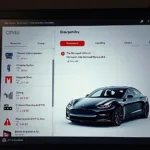Torque, measured in Newton meters (Nm), and power, measured in horsepower (HP), are two crucial factors for a car’s performance. Confusion often arises about the relationship between these two values. This article explains what Newton meters and HP mean and how they work together. We will also answer common questions on this topic and provide you with valuable insights into the world of automotive mechanics.
You feel the force of torque immediately after starting off, as the engine accelerates the car. Learn more under Newtonmeter Formula.
What is Torque (Newton Meter)?
Torque is the force that produces rotational movement. In the context of a car, it describes the force with which the engine rotates the crankshaft. Higher torque means more power for accelerating, overtaking, and towing loads. Imagine a wheel nut that needs to be tightened to a specific torque. This torque, measured in Newton meters, determines how tightly the wheel nut is fastened.
What is Power (HP)?
Power, on the other hand, describes how quickly work is done. In a car, power refers to the speed at which the engine produces torque. More HP means a higher top speed and faster acceleration. You can think of it this way: a powerful engine can lift a heavy weight quickly (high power), while an engine with high torque can lift the weight but potentially slower (high force).
The Relationship Between Newton Meter and HP
Torque and HP are closely related. Power results from torque multiplied by RPM and a constant factor. Put simply: an engine with high torque at low RPM can generate the same power as an engine with lower torque at high RPM. For driving practice, this means: an engine with high torque in the lower RPM range provides powerful starts and good responsiveness, while an engine with high power is more suitable for sporty driving. The correct rims are also important for the correct torque of your wheel nuts. Learn more under Drehmoment Radmuttern Alufelgen.
Converting Newton Meter to HP?
A direct conversion from Newton meters to HP is not possible because RPM plays a crucial role. The two units measure different physical quantities. “Newton meter to HP” is therefore more of a colloquial phrase expressing the desire to understand the engine’s force. Dr. Franziska Müller, a renowned automotive engineer and author of “Power and Motion in Automobiles,” emphasizes: “It is important to consider both torque and power to comprehensively assess an engine’s performance.”
Common Questions About Newton Meter and HP
- What is more important: Newton meters or HP? Both values are important and fulfill different roles. For everyday use, high torque at low RPMs is often more advantageous, while for sporty driving, power is the focus.
- How do Newton meters and HP affect fuel consumption? High torque at low RPMs can lead to lower fuel consumption because the engine doesn’t need to rev as high.
- Can the torque and power of an engine be increased? Yes, through tuning measures such as chip tuning or the installation of other components, both torque and power can be increased.
More information about tightening tires can be found under Reifen Schrauben Drehmoment.
What Should I Look For When Buying a Car?
When buying a car, pay attention not only to the HP number but also to the torque curve. High torque in the lower RPM range ensures pleasant driving in everyday life. Also, inform yourself about the specific requirements of your vehicle, for example, the correct torque for the wheel nuts. A look into the owner’s manual or advice from a specialist can help here. For the BMW M5 2015, you can find the information here: BMW M5 2015.
Conclusion
Newton meters and HP are two important key figures for assessing an engine’s performance. While Newton meters indicate the rotational or driving force, the HP number describes the power, i.e., how quickly work is done. For a comprehensive understanding of engine performance, it is important to consider both values. Contact us at autorepairaid.com if you have questions or need support from our experts. We are happy to help!

